Analysis: Tiran and Sanafir are Egyptian, after all
Egypt's High Administrative Court on Monday rejected the government's appeal against cancelling the Red Sea islands deal that would have handed over sovereignty of the Tiran and Sanafir islands to Saudi Arabia.
The final verdict closed a round of hearings that turned down appeals in the case - in which the government sought court approval for the contentious agreement based on which the two islands were deemed to be within Saudi territorial waters.
The Supreme Administrative Court ruled the Egyptian government had provided inadequate evidence supporting Saudi Arabia's claim to the land.
"The court has confirmed the islands are Egyptian, Saudi Arabia has no authority on this land, we've won our battle," rejoiced defendant Malek Adly after the final ruling was issued.
Judge Ahmed El-Shazly said in court that "Egypt's sovereignty over Tiran and Sanafir is absolute; the government did not present a document that changes this fact."
The maritime demarcation deal has sparked widespread criticism of the state in the past year. A statement was this month signed by around 3,000 Egyptian public figures, politicians and activists voicing their rejection to the transfer of the islands to Saudi Arabia.
 |
|
| [Click to enlarge] |
Speaking to local newspaper Al-Masry Al-Youm, Attiya Moussa, MP for Sharm el-Sheikh, said that he never thought the day would come when he would be asked whether Tiran and Sanafir were Egyptian or Saudi.
MP for Ras Sudr, Nour Salama, categorically rejected the agreement, stressing that both islands were always Egyptian.
Likewise, Mount Sinai MP Gharib Hassan and Sarah Saleh, MP for South Sinai, expressed their firm condemnation.
Scores of Egyptians took to the streets in April last year over Tiran and Sanafir. Dozens of protesters were arrested for illegally demonstrating, others prosecuted on charges of disseminating false information - after publicly stating that the islands were Egyptian.
Rights lawyer Malek Adly and journalists Amr Badr and Mahmoud al-Sakka were among those arrested.
Two weeks ago, twelve people were arrested near the Journalists' Syndicate in downtown Cairo. A rally had been organised following the cabinet's decision to approve the deal and refer it to parliament for discussion without waiting for the ruling of the High Administrative Court, a move condemned by lawyers as unconstitutional.
 |
This agreement no longer exists after it was voided by the administrative judiciary, but the government insists on implementing it |  |
"This agreement no longer exists after it was voided by the administrative judiciary, but the government insists on implementing it and delivering the islands to Saudi Arabia, against the popular will," read a Facebook post promoting the march.
Fresh demonstrations against the Egyptian-Saudi island deal were rescheduled to last Saturday, then indefinitely postponed by the organisers after a court ruling changed the protest location from outside the cabinet headquarters in downtown Cairo to Fustat Garden, where no prior authorisation is required under the protest law.
 |
|
Based on a controversial 2013 law, authorities have to receive notification 72 hours prior to a protest, or it is deemed illegal and those participating risk prison terms and heavy fines. Thousands have been detained over the past four years for protesting, and are serving harsh prison sentences.
Growing opposition to the border deal has come from lawyers, activists as well as from a large number of MPs - including some who are usually close to the state.
This is a "sentimental issue" for the Egyptian people, given the historic role of the islands in the nation's defence, commented law professor Dr Dalia Hussein. She made reference to the wars with Israel, including the Suez Crisis of 1956 and the 1967 War.
Tiran and Sanafir are strategically positioned at the southern tip of the Gulf of Aqaba, which leads to Israel and Jordan, and lie in key international shipping routes in the Red Sea. The islands are vital to the security of Egypt's Sinai Peninsula and Egyptian territorial waters in the Red Sea, analysts say.
 |
We're dealing with a dictatorial regime that is seeking to satisfy its strategic ally [Saudi Arabia] for the billions of dollars in aid given to Egypt |  |
Still, popular dissent has been largely ignored by Sisi.
"We're dealing with a dictatorial regime that is seeking to satisfy its strategic ally [Saudi Arabia] for the billions of dollars in aid given to Egypt. This regime doesn’t respect our rights, not even our land," Adly argued.
"We opponents are treated like traitors, those who want to destroy the country," he added. "But we have to fight for our historic rights and natural resources."
The legal dispute surrounding the Red Sea islands case goes back to April 2016, when President Sisi transferred Tiran and Sanafir to Saudi Arabian sovereignty in a maritime border demarcation agreement. Shortly after, a group of lawyers, including Khaled Ali and Malek Adly, filed a lawsuit before the State Council's administrative court to contest the deal.
The government claimed that the islands originally belonged to Saudi Arabia, but were only placed under Egyptian administration in the 1950s - at the request of the Gulf monarchy - for their protection.
To challenge the claim, the legal team provided evidence in support of Egypt's ownership of the islands that included historic maps, three items of British correspondence dating back to 1936, a 1940 Cambridge University atlas, and documents referring to Egypt's control over the islands under a 1906 maritime treaty between Egypt and the Ottoman Empire - before the founding of Saudi Arabia in 1932.
Adly described as "untrue rumours" the two main arguments used regarding status of the two islands: first, that they had never been Egyptian, and second, sovereignty over the islands had been ceded to Saudi Arabia.
Citing Article 151 of the Constitution, Dr Hussein affirmed that it was prohibited to conclude any deal giving away any part of Egypt's territory to another country.
"In all cases, no treaty may be concluded which is contrary to the provisions in the Constitution or which leads to concession of state territories," the article stipulates.
In June, an Egyptian administrative court annulled the maritime accord signed by Premier Sherif Ismail, saying it contravened the constitution. The government appealed the ruling on several fronts. In November, the court denied the state's appeal and accepted the defence's request to force the state to comply with the June verdict.
In a surprise turn, at the end of December, the cabinet decided to send the agreement to parliament for approval anyway - despite it having been declared void by the State Council. Parliament, however, refrained from planning any hearings on the matter. Then Monday's verdict put an end to the case.
Legal defendant Adly maintained that the final ruling sends a message across the country that the president and his government had betrayed Egypt by trying to give up part of its land.
"It also sends a message outside, that this regime is making illegal deals with other countries," the lawyer noted. "I think this case will affect future deals as this government clearly disregards our constitution, our laws and our people."



